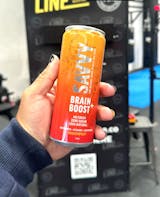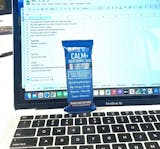L-theanine (N-ethyl-L-glutamine) or theanine is a major amino acid uniquely found in green tea.
Research indicates that L-theanine promotes relaxation without drowsiness. Promoting a feeling best described as “Zenergy” whereby there is a sensation of energy with control - so you are focussed with mental clarity.
L Theanine is highly synergistic with caffeine whereby it can “reduce the side-effects of caffeine” while increasing the benefits of caffeine. There is a pronounced synergistic effect. This means you experience heightened focus, awareness, and energy, as well as reduced stress, healthy vascular function and improved mental endurance at higher levels.
|
L-theanine Fast Facts
|
- L-theanine promotes feelings of “zenergy” - calm, attentive and focused energy
- Increases blood flow to the brain - leading to an increase of cognitive function and positive mood
- Improves attention and alertness with resilience to distractions
- Removes the jitters and other side effects of caffeine
|
L-Theanine as an active ingredient of Savvy
Amount used: 200mg
Active ingredient: L-Theanine
Why: 200mg of l-theanine is the perfect dose according to science to have a very beneficial effect on adults when paired in a 2:1 ratio with caffeine. L theanine and caffeine work very well together and this is why it has been added to Savvy.
The combination of L-theanine and caffeine will support a more centred feeling of mental energy, alertness, and focus than what a person may experience with caffeine on its own. This can show up as experiencing a sense of flow and enhanced productivity, while feeling calmer and less stressed.
We included it in Savvy Brain Boost because the nootropic combination supports focused attention, mental alertness, and feelings of calm energy.
Main benefits for Savvy
- Promotes feelings of “zenergy” - being calm, attentive and focussed
- Increased blood flow to the brain leading to an increase of cognitive function and positive mood
- Improved memory and attention with resilience to distractions
To make it easy to identify all the different studies - we will highlight them for you!
We really hope you enjoy our many years of research when formulating Savvy...
Benefit 1: L-theanine promotes feelings of “zenergy” - being calm, attentive and focused
Nathan, PJ, et al, ‘The neuropharmacology of L-theanine(N-ethyl-L-glutamine): a possible neuroprotective and cognitive enhancing agent.’ in Journal of herbal pharmacotherapy, Volume 6, Issue 2, 2006, pp 21 - 30 [Link]
“L-theanine (N-ethyl-L-glutamine) or theanine is a major amino acid uniquely found in green tea. L-theanine has been historically reported as a relaxing agent, prompting scientific research on its pharmacology. Animal neurochemistry studies suggest that L-theanine increases brain serotonin, dopamine, GABA levels and has micromolar affinities for AMPA, Kainate and NMDA receptors. In addition has been shown to exert neuroprotective effects in animal models possibly through its antagonistic effects on group 1 metabotrophic glutamate receptors. Behavioural studies in animals suggest improvement in learning and memory. Overall, L-theanine displays a neuropharmacology suggestive of a possible neuroprotective and cognitive enhancing agent...”
Nobre, AC, et al. ‘L-theanine, a natural constituent in tea, and its effect on mental state’ in Asia Pacific journal of clinical nutrition, Volume 17, Supplement 1, 2008, pp 167-168. [Link]
“tea also contains a unique amino acid, L-theanine that may modulate aspects of brain function in humans… L-theanine significantly increases activity in the alpha frequency band which indicates that it relaxes the mind without inducing drowsiness…”
Haskell, CF, et al, ‘The effects of L-theanine, caffeine and their combination on cognition and mood.’ in Biological psychology, Volume 77, Issue 2, February 2008. PP 113 - 122. [Link]
“the combination also led to faster simple reaction time, faster numeric working memory reaction time and improved sentence verification accuracy. 'Headache' and 'tired' ratings were reduced and 'alert' ratings increased. There was also a significant positive caffeine x L-theanine interaction on delayed word recognition reaction time. These results suggest that beverages containing L-theanine and caffeine may have a different pharmacological profile to those containing caffeine alone.”
Camfield, DA, et al, ‘Acute effects of tea constituents L-theanine, caffeine, and epigallocatechin gallate on cognitive function and mood: a systematic review and meta-analysis.’ in Nutrition reviews, Volume 72, Issue 8, August 2014, pp 507 - 522. [Link]
“A systematic review and meta-analysis was conducted on 11 randomized placebo-controlled human studies of acute effects of tea constituents L-theanine and epigallocatechin gallate, administered alone or in combination with caffeine, on cognitive function and mood. The outcome measures of mood were alertness, calmness, and contentedness, derived from the Bond-Lader scales, and state anxiety, from the State-Trait Anxiety Inventory. Cognitive measures assessed were attentional switch, intersensory attention, and rapid visual information processing. Standardized mean differences between placebo and treatment groups are presented for each study and outcome measure. Meta-analysis using a random-effects model was conducted when data were available for three or more studies. Evidence of moderate effect sizes in favor of combined caffeine and L-theanine in the first 2 hours postdose were found for outcome measures Bond-Lader alertness, attentional switching accuracy, and, to a lesser extent, some unisensory and multisensory attentional outcomes. Moderator analysis of caffeine and L-theanine doses revealed trends toward greater change in effect size for caffeine dose than for L-theanine dose, particularly during the first hour postdose.”
Nobre, AC, et al, ‘L-theanine, a natural constituent in tea, and its effect on mental state.’ in Asia Pacific journal of clinical nutrition, Volume 17, Supplement 1, 2008 pp 167 - 168. [Link]
“L-theanine significantly increases activity in the alpha frequency band which indicates that it relaxes the mind without inducing drowsiness...These data indicate that L-theanine, at realistic dietary levels, has a significant effect on the general state of mental alertness or arousal. Furthermore, alpha activity is known to play an important role in critical aspects of attention.”
Hidese, Shinsuke et al. ‘Effects of L-theanine administration on stress-related symptoms and cognitive functions in healthy adults: a randomized controlled trial.’ Nutrients. Volume 11. Issue 10. 2019. pp. 2362 [Link]
This research randomized, placebo-controlled, crossover, and double-blind study aimed to examine the possible effects of 4 weeks L-theanine administration on stress-related symptoms and cognitive functions in healthy adults. Administration of 200 mg/day of L-theanine enhanced cognitive functions like verbal fluency, executive function.
Kunugi, Hiroshi et al. ‘Effects of Chronic L-theanine on Stress-related Symptoms and Cognitive Function in a Non-clinical Population: A Randomized Controlled Trial (P06-106-19).’ Current developments in nutrition. Volume 3. Issue Supplement_1. 2019. pp. nzz031-P06 [Link]
This research study conducted for 4 weeks by the administration of 200 mg/day of L-theanine improved verbal fluency and executive function when compared to placebo, thereby enhancing cognitive functions.
Baba, Yoshitake et al. ‘Effects of l-Theanine on Cognitive Function in Middle-Aged and Older Subjects: A Randomized Placebo-Controlled Study.’ Journal of Medicinal Food. Volume 24. Issue 4. 2021. pp. 333-341 [Link]
This research study was done to identify the cognitive functions after the intake of L-theanine. A double-blind, randomized, placebo-controlled study was conducted for 12 weeks. It was found that the single dose of L-theanine reduced the reaction time to attention tasks, and it increased the number of correct answers and decreased the number of omission errors in working memory tasks. Thus, in conclusion, L-theanine was found to improve attention, working memory and executive functions.
Chen, Yong et al. ‘L-Theanine Attenuates Isoflurane-Induced Injury in Neural Stem Cells and Cognitive Impairment in Neonatal Mice.’ Biological and Pharmaceutical Bulletin. Volume 43. Issue 6. 2020. pp. 938-945 [Link]
This study was conducted to evaluate whether L-theanine could attenuate isoflurane-induced damage in neural stem cells and cognitive impairment in young mice. Pretreatment with L-theanine attenuated isoflurane-caused damage and cognitive deficits, thereby providing neuroprotective benefits.
Hidese, Shinsuke et al. ‘Effects of L-theanine administration on stress-related symptoms and cognitive functions in healthy adults: a randomized controlled trial.’ Nutrients. Volume 11. Issue 10. 2019. pp. 2362 [Link]
“L-theanine (200 mg/day) powerfully blocked the development of both affective and cognitive abnormalities...”
Sakamoto, Filipe Lopes et al. ‘Psychotropic effects of L-theanine and its clinical properties: From the management of anxiety and stress to a potential use in schizophrenia.’ Pharmacological research. Volume 147. 2019. pp. 104395 [Link]
“Verbal memory and executive function were improved in individuals diagnosed with Major Depressive disorder supplemented 250 mg of L-theanine...
Healthy individuals supplemented with 200 mg of L-theanine showed improvement in the mood scale”
Wang, Qi et al. ‘L-theanine as a promising agent on brain health-promoting foods–A review.’ Journal of Food Bioactives. Volume 13. 2021 [Link]
“Poor learning ability and memory”
Deb, Satarupa et al. ‘Neuroprotective attributes of L-theanine, a bioactive amino acid of tea, and its potential role in Parkinson's disease therapeutics.’ Neurochemistry international. Volume 129. 2019. pp. 104478 [Link]
“Cognition”
Guo, Xiangyang et al. ‘Contribution of l-theanine to the formation of 2, 5-dimethylpyrazine, a key roasted peanutty flavor in Oolong tea during manufacturing processes.’ Food chemistry. Volume 263. 2018. pp. 18-28 [Link]
“L-theanine has some important biological activities such as improving sleep and memory ability.”
Hidese, Shinsuke et al. ‘Effects of L-theanine administration on stress-related symptoms and cognitive functions in healthy adults: a randomized controlled trial.’ Nutrients. Volume 11. Issue 10. 2019. pp. 2362 [Link]
This research randomized, placebo-controlled, crossover and double-blind study aimed to examine the possible effects of 4 weeks L-theanine administration on stress-related symptoms and cognitive functions in healthy adults. Administration of 200 mg/day of L-theanine reduced depression scale scores, thereby mentioning the ability of L-theanine in reducing stress-related ailments.
Shen, Manjun et al. ‘L‐theanine ameliorate depressive‐like behavior in a chronic unpredictable mild stress rat model via modulating the monoamine levels in limbic–cortical–striatal–pallidal–thalamic‐circuit related brain regions.’ Phytotherapy Research. Volume 33. Issue 2. 2019. pp. 412-421 [Link]
This research study investigated the effects of L-theanine (2 mg/kg) on monoamine levels in an animal model of depression. The results indicated that L-theanine has possibly antidepressant-like effects in the rat model, mediated by monoamine neurotransmitters in brain regions.
Ogawa, Shintaro et al. ‘Effects of L-theanine on anxiety-like behavior, cerebrospinal fluid amino acid profile, and hippocampal activity in Wistar Kyoto rats.’ Psychopharmacology. Volume 235. Issue 1. 2018. pp. 37-45 [Link]
This research study was conducted to examine the effects of repeated L-theanine administration on behaviour, levels of amino acids in the cerebrospinal fluid, and hippocampal activity in rats of anxiety and depressive disorder. The administration was done for 7-10 days at 0.4 mg/Kg/ day dosage that resulted in enhanced hippocampal activity and exerted anxiolytic effects, mediated by changes in glutamate and methionine levels in the brain.
Pangotra, Aditi et al. ‘Effectiveness of progressive muscle relaxation, biofeedback and L-theanine in patients suffering from anxiety disorder.’ Journal of Psychosocial Research. Volume 13. Issue 1. 2018. pp. 219-228 [Link]
The study aimed to investigate the efficiency of different intervention of L-theanine in the management of anxiety disorders. A cross-sectional study was carried out with the administration of 200 mg of L-theanine that resulted in an improvement in anxiety score after the amino acid administration.
Kunugi, Hiroshi et al. ‘Effects of Chronic L-theanine on Stress-related Symptoms and Cognitive Function in a Non-clinical Population: A Randomized Controlled Trial (P06-106-19).’ Current developments in nutrition. Volume 3. Issue Supplement_1. 2019. pp. nzz031-P06 [Link]
“The results suggest that 4 weeks of L-theanine (200 mg/day) administration is safe and effective on stress-related symptoms...”
Williams, Jackson L. et al. ‘The effects of green tea amino acid L-theanine consumption on the ability to manage stress and anxiety levels: A systematic review.’ Plant Foods for Human Nutrition. Volume 75. Issue 1. 2020. pp. 12-23 [Link]
This systematic review evaluated the effect of pure L-theanine intake, in the form of orally administered nutritional supplements on stress responses and anxiety levels in human randomised controlled trials. The findings suggested that supplementation of 200-400 mg/day of L-theanine may assist in the reduction of stress and anxiety in people exposed to stressful conditions.
Sakamoto, Filipe Lopes et al. ‘Psychotropic effects of L-theanine and its clinical properties: From the management of anxiety and stress to a potential use in schizophrenia.’ Pharmacological research. Volume 147. 2019. pp. 104395 [Link]
This literature review aimed at discussing the effects of L-theanine administration on anxiety disorders and psychological stress. The review identified that L-theanine administration at daily doses ranging from 200-400 mg for upto 8 weeks was safe and induced anxiolytic and anti-stress effects in acute and chronic conditions.
Wang, Qi et al. ‘L-theanine as a promising agent on brain health-promoting foods–A review.’ Journal of Food Bioactives. Volume 13. 2021 [Link]
“Stress, anxiety”
Rothenberg, Dylan O’Neill, and Lingyun Zhang. ‘Mechanisms underlying the anti-depressive effects of regular tea consumption.’ Nutrients. Volume 11. Issue 6. 2019. pp. 1361. [Link]
“...L-theanine, polyphenols and polyphenol metabolites, are capable of functioning through multiple pathways simultaneously to collectively reduce the risk of depression.”
Benefit 2: L-theanine increases blood flow to the brain - leading to an increase of cognitive function and positive mood
Dodd, FL, ‘A double-blind, placebo-controlled study evaluating the effects of caffeine and L-theanine both alone and in combination on cerebral blood flow, cognition and mood.’ in Psychopharmacology (Berl), Volume 232, Issue 14, July 2015, pp 2563 - 2576. [Link]
“Caffeine reduced oxygenated haemoglobin (oxy-Hb), increased deoxygenated haemoglobin (deoxy-Hb), improved performance on attention tasks and increased overall mood ratings….Combining L-theanine with caffeine, at levels and ratios equivalent to one to two cups of tea, eliminated the vasoconstrictive effect and behavioural effects of caffeine. This supports previous findings of an interaction between these substances.”
Satarupa, D, ‘Neuroprotective attributes of L-theanine, a bioactive amino acid of tea, and its potential role in Parkinson's disease therapeutics’ in Neurochemistry International, Volume 129, October 2019 [Link]
“This unique amino acid also bears a potential to ameliorate the pathophysiological changes associated with Parkinson's disease as it displays antioxidant and anti-inflammatory properties, improves motor behavioral abnormalities, increases dopamine availability and may cause a favorable downshift in neurodegeneration due to glutamate excitotoxicity.”
Benefit 3: Improved memory and attention with resilience to distractions
Kelly, SP, ‘L-theanine and caffeine in combination affect human cognition as evidenced by oscillatory alpha-band activity and attention task performance.’ in The Journal of nutrition, Volume 138, Issue 8, August 2008, pp 1572S - 1577S [Link]
“Recent neuropharmacological research has suggested that certain constituents of tea may have modulatory effects on brain state...This may signify a more generalized tonic deployment of attentional resources to the visual modality and may underlie the facilitated behavioral performance on the combined ingestion of these 2 major constituents of tea.”
Owen, GN, et al, ‘The combined effects of L-theanine and caffeine on cognitive performance and mood.’ in Nutritional neuroscience, Volume 11, Issue 4, August 2008, pp 193 - 198. [Link]
“The L-theanine and caffeine combination improved both speed and accuracy of performance of the attention-switching task at 60 min, and reduced susceptibility to distracting information in the memory task at both 60 min and 90 min. These results replicate previous evidence which suggests that L-theanine and caffeine in combination are beneficial for improving performance on cognitively demanding tasks.”
Park, SK, et al, ‘A combination of green tea extract and l-theanine improves memory and attention in subjects with mild cognitive impairment: a double-blind placebo-controlled study.’ in Journal of medicinal food, Volume 14, Issue 4, pp 334 - 343. [Link]
“Brain theta waves, an indicator of cognitive alertness, were increased significantly in the temporal, frontal, parietal, and occipital areas after 3 hours in the eye-open and reading states. Therefore, this study suggests that [GTE and L-Theanine] LGNC-07 has potential as an intervention for cognitive improvement.”
Zhu, Guoqi et al. ‘Synaptic modification by L-theanine, a natural constituent in green tea, rescues the impairment of hippocampal long-term potentiation and memory in AD mice.’ Neuropharmacology. Volume 138. 2018. pp. 331-340. [Link]
The research study was aimed at investigating the role of L-theanine in hippocampal synaptic transmission and assessing the potential to improve memory in transgenic Alzheimer’s disease mice. The results of the study signified that L-theanine ameliorated the impairment of memory and hippocampal long-term potentiation, likely through the mechanism of dopamine D1/5 receptor- PKA pathway activation.
Nguyen, Bao Trong el al. ‘Theanine attenuates memory impairments induced by klotho gene depletion in mice.’ Food & function. Volume 10. Issue 1. 2019. pp. 325-332 [Link]
This research study investigated the self-administration of theanine that affects memory dysfunction. The results suggested that theanine attenuates memory impairments in a genetic ageing model via up-regulation of various signalling.
Deb, Satarupa et al. ‘Neuroprotective attributes of L-theanine, a bioactive amino acid of tea, and its potential role in Parkinson's disease therapeutics.’ Neurochemistry international. Volume 129. 2019. pp. 104478 [Link]
“Memory”
Based on studies like those listed above, Savvy Beverages developed Savvy Brain Boost to boost brain function. It’s a delicious beverage with amazing added supplements for daily use to provide long-lasting mental energy, support brain function and enhance cognitive performance.
Each delicious Savvy Coffee provides a clinical dose of many nootropics including L-Theanine (above), to decrease stress and fatigue while boosting focus and improving mood. Savvy also provides complementary herbs, amino acids, vitamins, and minerals with high levels of evidence for cognitive enhancement.








